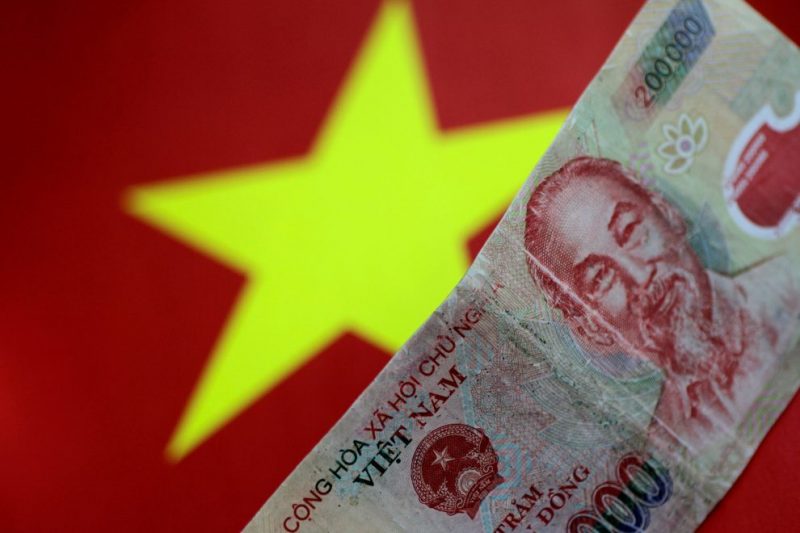Chinese investment in Vietnam has doubled this year, as Beijing competes with the US for influence in the Southeast Asia nation.
The boom in money from the north stands in contrast to a slowdown in US spending and trade, official data show.
The manufacturing hub stretching along the South China Sea is increasingly a key assembling link in global supply chains that often rely on Chinese components and US consumers.
US President Joe Biden achieved an upgrade of diplomatic relations with the former foe in a visit to Hanoi in September, after a year of intense diplomatic efforts to elevate the United States to the same tier as China in Vietnam’s ranking.
ALSO SEE: Carmakers Focus on Cost-Cutting to Rival Cheap Chinese EVs
China’s President Xi Jinping will travel to Vietnam next week with the aim of further deepening ties. He may agree to declare that the two countries share a common destiny, diplomats said, which could be interpreted in Beijing as a formal upgrade of diplomatic relations.
It is unclear which symbolic upgrade carries more weight, but in economic terms China appears to have had the upper hand so far, partly as a consequence of US trade policy.
US-China tension boosting Chinese investment
Tensions between Washington and Beijing and various US-led sanctions on China in recent years have encouraged Chinese investment in Vietnam.
Registered investment from China and Hong Kong combined rose to $8.2 billion in the first 11 months of this year, according to Vietnam’s official statistics, twice as much as in the same period last year when China had pandemic restrictions, making them the biggest investors in Vietnam.
US registered investment instead has fallen to $0.5 billion this year from $0.7 billion in 2022, making it the 10th largest investor after Pacific offshore centre Samoa and the Netherlands.
Bilateral trade also dropped, as US consumers grappled with a cost-of-living crisis this year and no tariff cuts were agreed during Biden’s visit.
Exports from Vietnam to the United States plunged 15% to $79.25 billion in the first 10 months of the year, Vietnam data show, and US imports fell as well.
In the same period Vietnam’s exports to China increased by 5% to nearly $50 billion, although imports fell as Vietnam largely buys from Beijing components that are assembled for export to Western countries.
Despite strong economic exchanges, relations with China are complicated by disputes over boundaries in the South China Sea. Anti-Chinese sentiment is also common among Vietnamese people, and it leads to frequent protests, including one in 2018 against the creation of special economic zones that could have benefitted Chinese companies.
China slowdown and ‘de-risking’ key factors
The US diplomatic upgrade came with the White House’s pledges of more investments and easier trade.
“Despite the fanfare during Biden’s visit we have not seen so far a lot materialise,” said Zachary Abuza, professor on Southeast Asian politics at the National War College in Washington DC, noting foreign businesses face significant challenges when investing in Vietnam.
Several Vietnam-based business consultants signalled an increase in US investors’ interest and noted that investment decisions take time to be made.
The parallel boom in Chinese investment, which excluding Hong Kong has nearly doubled this year above pre-pandemic levels to $3.9 billion, is partly explained by companies’ de-risking strategies amid US-China trade tensions, said Kyle Freeman, partner at business consultancy Dezan Shira.
China’s slowdown has also been a factor on investment decisions, said Chad Ovel, partner at Vietnam-focused private equity firm Mekong Capital. “(The) poor short to moderate-term macro outlook in China is motivating Chinese to find investment opportunities outside of their own country.”
- Reuters with additional editing by Jim Pollard
ALSO SEE:
China President Xi to Visit Vietnam For Security, Tie-Ups Talks
Seeking China Hedge, Top US Chip Firms to Join Biden in Vietnam
Vietnam Chip Engineer Shortage May Spoil US Plan to Rival China
Rare Earth Magnet Firms Plan Vietnam Plants as China Hedge
Chinese Energy Storage, Battery Firms Plan $1bn Vietnam Plants
Vietnam Power Cuts Hit Samsung, Foxconn, Canon Factory Hubs
Apple MacBook Manufacturer Quanta to Build Vietnam Factory
























